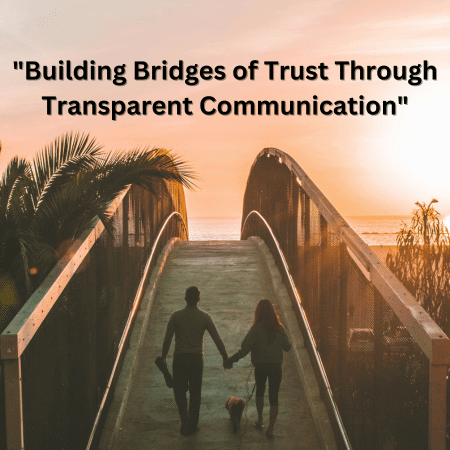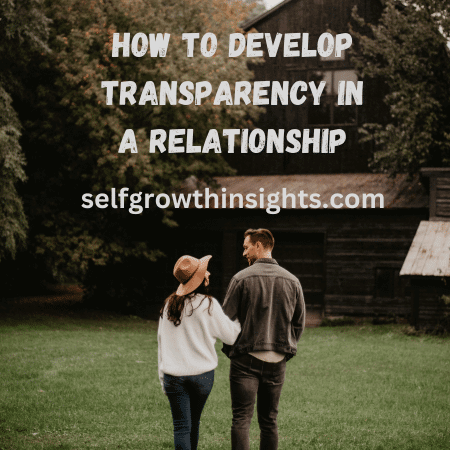Understanding is a pillar of any healthy relationship. Be open and honest with your partner about your thoughts, feelings, and actions. In today’s world, where communication can be hindered by many factors, trust in relationships is essential for long-term growth and survival. We need to explore this to strengthen our relationships. So keep learning…
Transparency in a relationship is fundamental and faithful to your partner. It’s about expressing your innermost thoughts, needs and concerns without fear of being judged or rejected. Be honest and sincere in your interactions, whether positive or negative.
What does it mean to understand in interaction?
Understanding in a relationship is being honest and open with each other. It’s like having a window you can see out of without a barrier blocking the view. If you are open you can share all your thoughts, ideas and experiences in an open way. It is about telling the truth about who you are, what you want and what you think.
Imagine a transparent bottle and you can see all the ingredients. This is how light works in relationships. This helps build trust because there is nothing to hide. Instead, you’re showing your loved one who you really are, flaws and all.
It’s like having a map laid out so both parties know where they’re going. Understanding can help avoid misunderstandings and facilitate discussions, leading to a more balanced and healthy lifestyle.

How to Establish Transparency in a Relationship
Building trust in a relationship requires hard work, dedication, and both parties working toward the end goal. Here are a few steps to encourage transparency:
Open Communication:
Create an environment of open communication where each partner feels safe to share their feelings, thoughts, and concerns openly and honestly. Encourage honest listening without judgment, while respecting each other’s experiences and ideas.
Build Trust: Build trust through trust, consistency, and transparency in decision making, keeping promises, honoring commitments, and making fair decisions throughout the interaction. Building trust takes time and patience, so be patient as you work to build it.
Thought Sharing:
Openly sharing positive and negative thoughts will encourage better relationships between partners, guide them towards a better relationship, build relationships, and ensure a relationship between you. Open up and talk to them about all your thoughts, good or bad! If they want, encourage them to do the same!
Be realistic: Be yourself and be the boss in your relationship. Don’t change yourself to please others, and don’t hide parts of yourself to please your chosen partner. Accept your strengths and weaknesses so your partner can see the real you, because he/she sees the real you!
Set boundaries: Set healthy boundaries in all relationships to keep yourself and your partner from seeing each other as boundaries. Setting these boundaries clearly, and also changing them when necessary – respectful boundaries – helps build relationships between people, which leads to mutual understanding and trust.
Resolve problems immediately: Always discuss problems in a relationship quickly and openly to avoid arguments or sweep the issue under the rug; this only creates tension and distrust in the partners. Approach all conflicts with compassion and openness and seek a mutually beneficial solution.
Empathy:
Empathy can be developed by putting yourself in your partner’s shoes and trying to understand from their perspective. Be supportive and patient when your partner shares their thoughts or feelings, even if they differ from your beliefs;
Honesty:
When your partner opens up and shows interest in you, show interest and maintain integrity in your relationship through acceptance and satisfaction. Express your gratitude for their loyalty and concern, then respond clearly and transparently.
Be patient and persevere:
Building clarity takes time and patience – be gentle with yourself and your partner as you navigate this journey together. Acknowledging progress, no matter how small, will go a long way as you work to develop long-term honesty and openness between the two of you!

Fear of Judgement
This fear stems from concerns that sharing their personal thoughts, feelings or actions might elicit negative judgment or criticism from companions – often stemming from lack of confidence within themselves and uncertainty regarding how others will react.
Past Hurt or Betrayal: Previous experiences of betrayal can leave emotional scars. People who have endured such injuries before might develop barriers around themselves in fear that opening themselves up again would only bring on additional hurt and heartache.
Untrustworthy: Trust is essential in order to create transparency; those lacking it might hesitate to speak up, fearing their friend might exploit any weaknesses they expose or use this knowledge against them. Sources of mistrust could range from past experiences, ongoing conflicts that remain unresolved or persistent doubts as to who you can entrust your information with.
Effective Communication Problems
Effective communication is vital to creating transparency; however many couples struggle in this area. Poorly developed skills such as speaking clearly or passive aggressive behavior could make for difficult dialogue; not actively listening or dismissing one of your viewpoints as quickly can also obstruct honesty in discussions between two participants.
Expectations in Families or Cultures: Expectations are an influential force on people’s views on relationships that value openness. Certain families or cultures might emphasize keeping peace or privacy over confrontation to encourage openness; breaking free of these expectations may prove challenging; even when necessary for long-term health and stability of the relationships involved.
Personal Insecurities. Struggles with self-esteem, rejection or feeling inadequate may make people reluctant to open up about who they really are – leading them to worry that doing so could result in abandonment by their partner, further compounded by pressures of society or unattainable standards of perfection, as well as comparison with others. This anxiety may only increase as pressures from society mount or unattainable standards set are in comparison with each other.
Power Dynamics Can Block Transparency
If the two partners do not possess equal powers or controls, imbalanced relationships could create barriers to trust. When one party holds greater influence or power than the other, that person might feel powerless to speak out truthfully or voice demands truthfully and may fear reprisals if they question the status quo – this cycle can become perpetuated and shut out new information altogether.
To successfully overcome these barriers, both parties need to work in concert to create a secure and supportive atmosphere where openness and vulnerability can flourish. Trust must be earned through consistent action aimed at healing past traumas with counseling or therapy sessions, honing communication knowledge through practice and perseverance, and questioning cultural or family expectations that limit the openness of relationships. It takes understanding, empathy, perseverance, and the desire for growth among community members for this journey to succeed.
Learn from your mistakes of the past and view them as opportunities for growth and progress. Forgiveness helps both parties move forward after conflicts or betrayals have taken place and rebuild trust between themselves.
Be free of old anger or grudges that might prevent you from opening up and being open with your partner. By keeping old grievances alive, these could contaminate future and present relationships and ruin both of them.
Commit to moving forward as a group using integrity, honesty and forgiveness as core values. Begin to embrace discovery and growth so as to strengthen bonds within your group and develop greater unity among its members.
Must Read
- How to Be a Submissive Husband – Benefits & Challenges
- Signs He Doesn’t Value You
- Do Cheaters Realize What They Lost?
- How To Stop Obsessing Over A Lost Friendship – 7 Steps
- Signs Of A Male Empath- Misconceptions About Male Empaths
Conclusion
Establishing transparency within any relationship requires commitment from both partners involved. Through communicating openly and building trust between themselves, sharing authentic feelings freely, and setting healthy boundaries, couples can form an honest and vulnerable foundation that strengthens their bonds. Addressing challenges promptly, seeking professional assistance when necessary, practicing empathy, and celebrating honesty are crucial steps toward creating transparency. Although overcoming barriers and developing an honest, transparent relationship may require time and perseverance, its rewards of deeper emotional intimacy, trust, and connection make the journey worthwhile. With dedication and mutual support couples can form an open, honest, and authentic partnership relationship.
